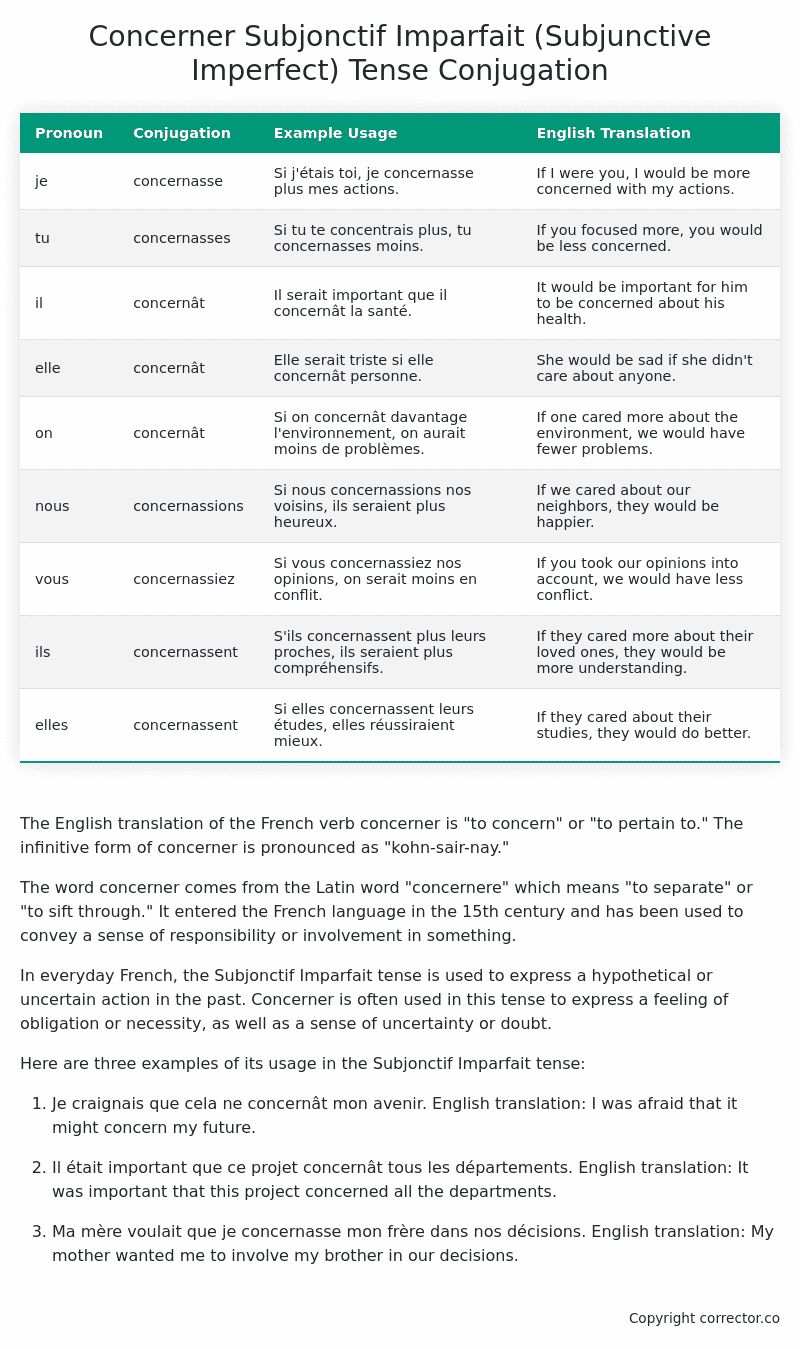Subjonctif Imparfait (Subjunctive Imperfect) Tense Conjugation of the French Verb concerner
Introduction to the verb concerner
The English translation of the French verb concerner is “to concern” or “to pertain to.” The infinitive form of concerner is pronounced as “kohn-sair-nay.”
The word concerner comes from the Latin word “concernere” which means “to separate” or “to sift through.” It entered the French language in the 15th century and has been used to convey a sense of responsibility or involvement in something.
In everyday French, the Subjonctif Imparfait tense is used to express a hypothetical or uncertain action in the past. Concerner is often used in this tense to express a feeling of obligation or necessity, as well as a sense of uncertainty or doubt.
Here are three examples of its usage in the Subjonctif Imparfait tense:
-
Je craignais que cela ne concernât mon avenir.
English translation: I was afraid that it might concern my future. -
Il était important que ce projet concernât tous les départements.
English translation: It was important that this project concerned all the departments. -
Ma mère voulait que je concernasse mon frère dans nos décisions.
English translation: My mother wanted me to involve my brother in our decisions.
Table of the Subjonctif Imparfait (Subjunctive Imperfect) Tense Conjugation of concerner
| Pronoun | Conjugation | Example Usage | English Translation |
|---|---|---|---|
| je | concernasse | Si j’étais toi, je concernasse plus mes actions. | If I were you, I would be more concerned with my actions. |
| tu | concernasses | Si tu te concentrais plus, tu concernasses moins. | If you focused more, you would be less concerned. |
| il | concernât | Il serait important que il concernât la santé. | It would be important for him to be concerned about his health. |
| elle | concernât | Elle serait triste si elle concernât personne. | She would be sad if she didn’t care about anyone. |
| on | concernât | Si on concernât davantage l’environnement, on aurait moins de problèmes. | If one cared more about the environment, we would have fewer problems. |
| nous | concernassions | Si nous concernassions nos voisins, ils seraient plus heureux. | If we cared about our neighbors, they would be happier. |
| vous | concernassiez | Si vous concernassiez nos opinions, on serait moins en conflit. | If you took our opinions into account, we would have less conflict. |
| ils | concernassent | S’ils concernassent plus leurs proches, ils seraient plus compréhensifs. | If they cared more about their loved ones, they would be more understanding. |
| elles | concernassent | Si elles concernassent leurs études, elles réussiraient mieux. | If they cared about their studies, they would do better. |
Other Conjugations for Concerner.
Le Present (Present Tense) Conjugation of the French Verb concerner
Imparfait (Imperfect) Tense Conjugation of the French Verb concerner
Passé Simple (Simple Past) Tense Conjugation of the French Verb concerner
Passé Composé (Present Perfect) Tense Conjugation of the French Verb concerner
Futur Simple (Simple Future) Tense Conjugation of the French Verb concerner
Futur Proche (Near Future) Tense Conjugation of the French Verb concerner
Plus-que-parfait (Pluperfect) Tense Conjugation of the French Verb concerner
Passé Antérieur (Past Anterior) Tense Conjugation of the French Verb concerner
Futur Antérieur (Future Anterior) Tense Conjugation of the French Verb concerner
Subjonctif Présent (Subjunctive Present) Tense Conjugation of the French Verb concerner
Subjonctif Passé (Subjunctive Past) Tense Conjugation of the French Verb concerner
Subjonctif Imparfait (Subjunctive Imperfect) Tense Conjugation of the French Verb concerner (this article)
Subjonctif Plus-que-parfait (Subjunctive Pluperfect) Tense Conjugation of the French Verb concerner
Conditionnel Présent (Conditional Present) Tense Conjugation of the French Verb concerner
Conditionnel Passé (Conditional Past) Tense Conjugation of the French Verb concerner
L’impératif Présent (Imperative Present) Tense Conjugation of the French Verb concerner
L’infinitif Présent (Infinitive Present) Tense Conjugation of the French Verb concerner
Struggling with French verbs or the language in general? Why not use our free French Grammar Checker – no registration required!
Get a FREE Download Study Sheet of this Conjugation 🔥
Simply right click the image below, click “save image” and get your free reference for the concerner Subjonctif Imparfait tense conjugation!

Concerner – About the French Subjonctif Imparfait (Subjunctive Imperfect) Tense
Formation
Common Everyday Usage Patterns
Interactions with Other Tenses
Subjonctif Présent
Indicatif Passé Composé
Conditional
Conditional Perfect
Summary
I hope you enjoyed this article on the verb concerner. Still in a learning mood? Check out another TOTALLY random French verb conjugation!


